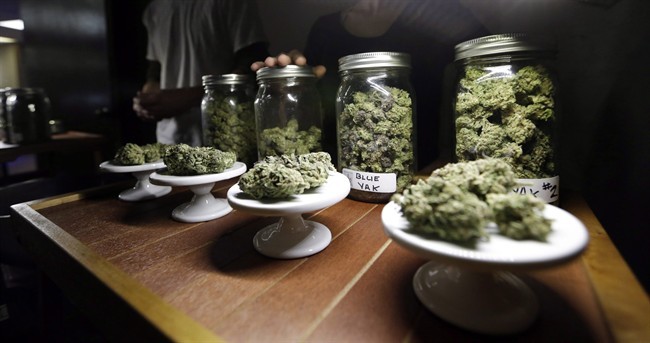MONTREAL – The public debate over marijuana has largely been one of binary legal options: either keep the substance prohibited or legalize it.

Federal Liberal Party leader Justin Trudeau’s controversial comments last week that suggested he may now be in favour of decriminalization only served to further illustrate this point.
Read more: Justin Trudeau wants to legalize marijuana
What is more rarely discussed is what a “legalization strategy” would actually look like, and what it could concretely entail.
The health implications for a start are far from clear-cut, although those who rely on it for medicinal purposes don’t think it’s complicated.
“I’m not doing drugs, I’m medicated,” Victoria Hollinrake told Global News. The Hawkesbury resident has a prescription for marijuana to treat her chronic nerve disorder, trigeminal neuralgia.
“I never dreamed I’d be in this position. I’m not looking to get high, I’m looking to be at ease in my body.”
It took two years for Hollinrake to persuade her doctor to consider a prescription.
But the use of marijuana for medicinal purposes has a number of defenders among practising physicians.
“There are patients who do seem to benefit” from using it, argued Dr. Mitch Shulman, a physician at the Royal Victoria Hospital in Montreal and an assistant professor at McGill University.
- ‘Shock and disbelief’ after Manitoba school trustee’s Indigenous comments
- Invasive strep: ‘Don’t wait’ to seek care, N.S. woman warns on long road to recovery
- ‘Super lice’ are becoming more resistant to chemical shampoos. What to use instead
- Canadian food banks are on the brink: ‘This is not a sustainable situation’
This view is broadly shared by the National Organization for the Reform of Marijuana Laws (NORML) in Canada.
Its spokesperson, Craig Jones, insisted that the drug has “a range of therapeutic effects.”
Yet several health problems have been associated with recreational marijuana use.
In the most recent issue of The Lancet, for instance, Professors Wayne Hall and Louisa Degenhardt showed that among the most probable negative implications of chronic cannabis use were heart disease, mental health and residual cognitive and respiratory function impairment.
This study is echoes the British Lung Foundation’s assessment last year that, contrary to popular belief, marijuana smoke was as much as 20 times more carcinogenic than tobacco smoke.
It is a striking claim, considering the flurry of increasing governmental crackdowns on cigarette smoking over the course of the last few decades.
Physicians for a Smoke-Free Canada, a group that has pushed for and helped shepherd several of anti-tobacco measures. sees marijuana legalization as deeply misguided.
“To use alcohol and tobacco as a benchmark is an incredibly poorly thought-out idea,” said the organization’s executive director Cynthia Callard. She suggested that it would be akin to “opening the door to another public health disaster.”
Where she and NORML’s Craig Jones appear to see eye to eye is in their concern over private companies taking over an eventual legal marijuana market.
Jones sees a risk in marijuana manufacturing companies putting in additives, similar to what tobacco companies have done.
A hypothetical legal marijuana market also holds many additional questions related to its basic structure.
The product could be taxed – but to what extent? It could be regulated – but how, exactly?
Two U.S. states – Colorado and Washington – made headlines around the world last fall when voters there approved ballot measures legalizing the drug.
What has received less scrutiny is the measure’s actual implementation.
Read more: Colorado, Washington legalize marijuana: could Canada be next?
In Colorado, for example, voters will head back to the polls this November to decide whether a 15 per cent tax on unprocessed marijuana and an additional 10 per cent excise tax on the sale of retail marijuana should be levied.
“If voters were to vote against the ballot measure,” said Daria Serna from the state’s Department of Revenue, “there would be no excise tax whatsoever on marijuana and the sales tax would be the state’s (general) sales tax of 2.9 per cent.”
To compare to other highly taxed items, on top of the sales tax, Colorado imposes a 4.2 per cent excise tax per cigarette (amounting to 82 cents a pack) and 8 cents per gallon (or 3.8 litres) of beer.
In Washington State, regulations were released earlier this summer, and doubts abound about what the state should do (if anything) to try to prevent market consolidation.
There remains “a lot of intellectual heavy lifting” to do, conceded Jones.
“Cannabis is so easy to grow and such a social thing that it might be hard to put the genie in the bottle” if legalization were ever to become a reality.
That suggests a great deal of questions need to be addressed. For now, many of these remain without a clear answer.




Comments